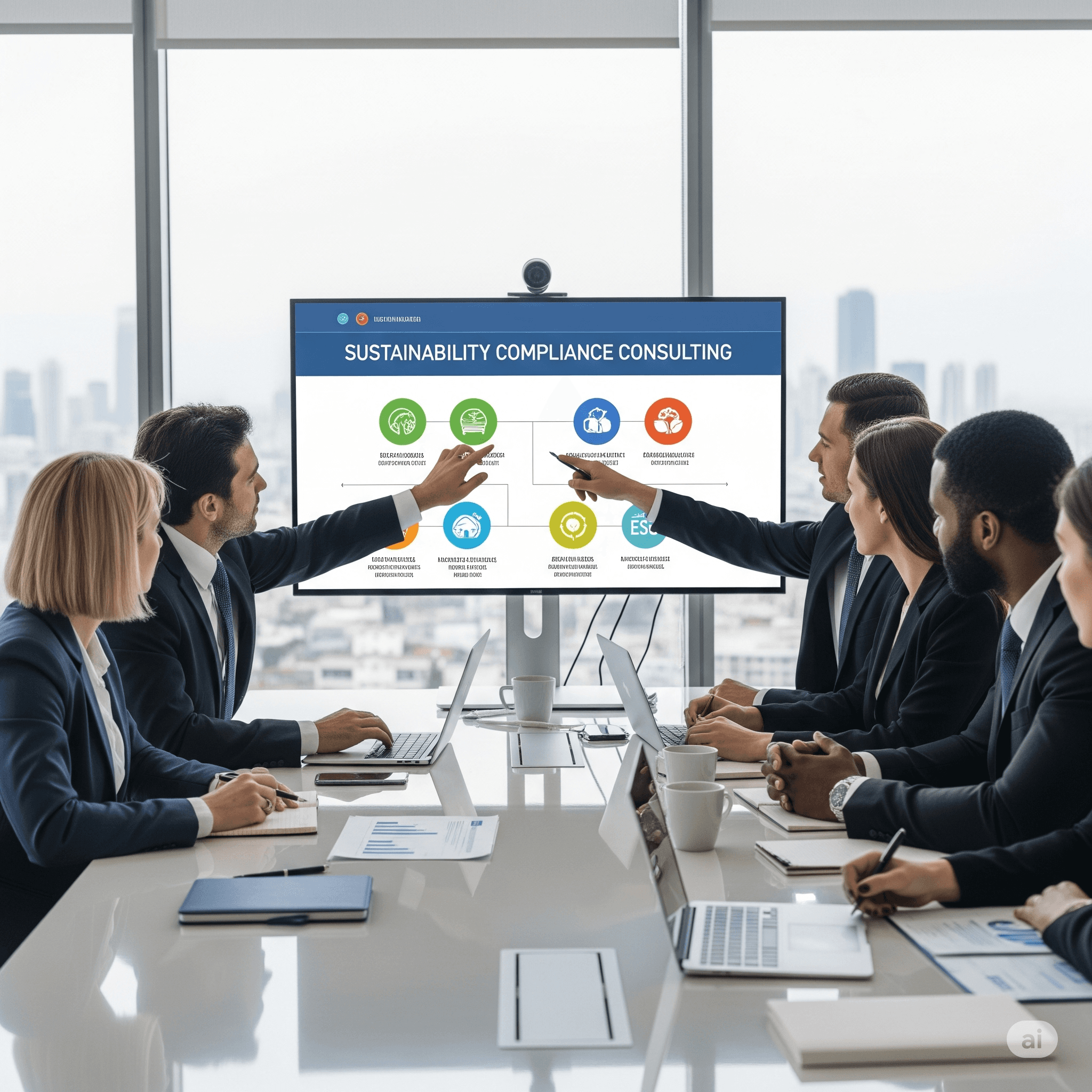The Role of Analytics in Green Business Practices: Data-Driven Sustainability Transformation
Discover how advanced analytics revolutionizes green business practices in 2025 through comprehensive environmental measurement, predictive modeling, risk management, and strategic decision-making that drives sustainable transformation and competitive advantage.

Introduction
The Evolution of Sustainability Analytics: From Reporting to Strategic Intelligence
Sustainability analytics has evolved from simple compliance reporting to comprehensive strategic intelligence platforms that integrate environmental, social, and governance data with business operations to provide holistic insights for sustainable decision-making. Modern analytics platforms process vast amounts of data from energy systems, supply chains, operations, and external sources to create real-time visibility into environmental performance while identifying optimization opportunities and emerging risks. This evolution reflects the growing recognition that sustainability data is not merely for reporting purposes but represents critical business intelligence that can drive operational efficiency, cost reduction, and competitive advantage while supporting long-term business resilience.

Analytics Impact on Sustainability Performance
Organizations implementing analytics-driven sustainability strategies achieve 20% reduction in energy costs, 30% improvement in resource optimization, and 40% faster environmental reporting while demonstrating measurable progress toward sustainability goals and stakeholder commitments.
- Real-Time Environmental Monitoring: Continuous data collection and analysis from sensors, meters, and IoT devices providing immediate visibility into environmental performance
- Predictive Sustainability Modeling: Advanced algorithms that forecast environmental trends, resource needs, and sustainability outcomes to support proactive decision-making
- Integrated ESG Intelligence: Comprehensive platforms that combine environmental, social, and governance data with business metrics for holistic sustainability insights
- Automated Compliance Reporting: Systems that generate regulatory reports and sustainability disclosures automatically from operational data with audit-ready documentation
- Strategic Decision Support: Analytics platforms that connect sustainability metrics to business outcomes, enabling data-driven strategic planning and resource allocation
Comprehensive Environmental Measurement and Reporting
Advanced analytics enables precise measurement and reporting of environmental impact across all business operations through integrated data collection, automated calculation methodologies, and comprehensive reporting frameworks that meet international standards and stakeholder expectations. Organizations utilize sophisticated monitoring systems that track direct and indirect emissions, resource consumption, waste generation, and environmental compliance in real-time while providing detailed analytics that identify trends, anomalies, and improvement opportunities. This comprehensive measurement capability supports accurate sustainability reporting, regulatory compliance, and strategic planning while building stakeholder trust through transparent, verifiable environmental data.
| Environmental Metric Category | Data Collection Methods | Analytics Applications | Business Benefits |
|---|---|---|---|
| Carbon Emissions | IoT sensors, smart meters, supply chain tracking, travel logs | Scope 1/2/3 calculations, trend analysis, reduction opportunity identification | Accurate reporting, compliance, cost reduction strategies |
| Energy Consumption | Smart building systems, equipment monitoring, utility data integration | Efficiency analysis, demand forecasting, optimization recommendations | Cost savings, peak demand management, renewable integration |
| Water Usage | Flow sensors, quality monitors, treatment system data | Consumption patterns, waste reduction, recycling optimization | Resource conservation, cost management, risk mitigation |
| Waste Generation | Tracking systems, composition analysis, disposal monitoring | Waste stream analysis, circular economy opportunities, diversion rates | Cost reduction, regulatory compliance, sustainability goals |
Predictive Analytics for Sustainability Risk Management
Predictive analytics transforms sustainability risk management by enabling organizations to anticipate environmental challenges, resource constraints, and regulatory changes before they impact business operations. Advanced modeling techniques analyze historical data, external factors, and emerging trends to forecast potential sustainability risks including climate impacts, resource scarcity, regulatory changes, and stakeholder expectations while providing early warning systems that enable proactive risk mitigation. This predictive capability helps organizations build resilience while maintaining operational continuity and competitive advantage in dynamic environmental and regulatory landscapes.
"Predictive sustainability analytics transforms reactive compliance into proactive strategic advantage by enabling organizations to anticipate environmental challenges and opportunities while building resilience through data-driven planning and risk mitigation strategies."
— Sustainability Analytics Leadership Report 2025
Operational Optimization Through Data-Driven Insights
Analytics-driven operational optimization enables organizations to improve environmental performance while reducing costs through intelligent resource management, process optimization, and waste minimization based on comprehensive data analysis and machine learning algorithms. Organizations leverage real-time analytics to optimize energy consumption, minimize waste generation, improve supply chain efficiency, and enhance resource utilization while maintaining operational performance and customer satisfaction. This optimization approach delivers both environmental benefits and business value through reduced costs, improved efficiency, and enhanced competitiveness in sustainability-conscious markets.
- Energy Management Optimization: AI-powered systems that automatically adjust building systems, equipment operation, and energy consumption for minimum environmental impact
- Supply Chain Sustainability: Analytics platforms that optimize logistics, supplier selection, and material flows for reduced emissions and improved efficiency
- Waste Stream Analysis: Advanced analytics identifying waste reduction opportunities, circular economy potential, and resource recovery strategies
- Resource Utilization Intelligence: Data-driven insights that optimize water, materials, and energy usage across operations for maximum efficiency
- Process Performance Monitoring: Continuous analysis of operational processes to identify sustainability improvements and efficiency enhancements
Strategic Decision-Making and ESG Integration
Advanced analytics supports strategic decision-making by integrating environmental, social, and governance data with business intelligence to provide comprehensive insights that align sustainability goals with business objectives. Strategic analytics platforms enable executives to evaluate the business impact of sustainability initiatives, assess investment opportunities, and make informed decisions about resource allocation while considering environmental, financial, and stakeholder implications. This integration ensures that sustainability considerations are embedded in business strategy rather than treated as separate initiatives, creating more effective and sustainable business transformation.

Stakeholder Engagement and Transparency
Analytics-powered transparency and stakeholder engagement create trust and accountability through real-time sustainability dashboards, automated reporting systems, and open data initiatives that demonstrate authentic commitment to environmental responsibility. Organizations leverage analytics to create compelling sustainability narratives supported by verifiable data while providing stakeholders with access to environmental performance information through interactive dashboards and comprehensive reports. This transparency builds stakeholder trust, enhances brand reputation, and supports sustainable business relationships while demonstrating accountability and continuous improvement in environmental performance.
Stakeholder Engagement Through Data Transparency
Organizations providing transparent, analytics-driven sustainability reporting experience 35% improvement in stakeholder trust, enhanced brand reputation, and stronger relationships with investors, customers, and communities committed to environmental responsibility.
AI and Machine Learning in Sustainability Analytics
Artificial intelligence and machine learning algorithms enhance sustainability analytics by processing complex environmental data, identifying patterns that human analysis might miss, and providing predictive insights that support proactive sustainability management. AI-powered analytics systems continuously learn from operational data, external factors, and sustainability outcomes to improve prediction accuracy and optimization recommendations while automating routine analysis tasks that enable sustainability teams to focus on strategic initiatives. These advanced capabilities enable more sophisticated sustainability management that adapts to changing conditions and continuously improves environmental performance.
| AI Application | Sustainability Function | Technical Capability | Business Value |
|---|---|---|---|
| Anomaly Detection | Environmental compliance monitoring, resource waste identification | Pattern recognition, threshold alerting, root cause analysis | Reduced compliance risk, improved efficiency, cost savings |
| Predictive Modeling | Demand forecasting, resource planning, risk assessment | Time series analysis, scenario modeling, trend prediction | Proactive planning, optimized resource allocation, risk mitigation |
| Natural Language Processing | Regulatory monitoring, stakeholder sentiment analysis, report generation | Text analysis, sentiment assessment, automated documentation | Regulatory compliance, stakeholder insights, operational efficiency |
| Computer Vision | Visual monitoring of environmental conditions, waste analysis | Image recognition, visual analytics, automated inspection | Enhanced monitoring accuracy, reduced manual effort, improved compliance |
Supply Chain Sustainability Analytics
Supply chain sustainability analytics provides end-to-end visibility into environmental and social impact across value networks while enabling organizations to optimize supplier relationships, reduce emissions, and ensure ethical sourcing practices. Advanced analytics platforms integrate data from suppliers, logistics providers, and third-party assessments to create comprehensive supply chain intelligence that supports sustainable procurement decisions and supplier engagement strategies. This capability enables organizations to reduce supply chain risks, improve sustainability performance, and demonstrate responsible business practices while maintaining operational efficiency and competitive advantage.
- Supplier Sustainability Assessment: Comprehensive evaluation of supplier environmental and social performance using standardized metrics and benchmarking
- Carbon Footprint Tracking: End-to-end measurement of supply chain emissions including transportation, manufacturing, and distribution activities
- Ethical Sourcing Verification: Analytics-supported verification of responsible sourcing practices and compliance with social and environmental standards
- Logistics Optimization: Data-driven optimization of transportation routes, modes, and consolidation opportunities for reduced environmental impact
- Risk Management: Predictive analytics identifying supply chain sustainability risks and enabling proactive mitigation strategies
Regulatory Compliance and Standards Alignment
Analytics platforms enable seamless compliance with evolving sustainability regulations and standards by automating data collection, calculation methodologies, and report generation while maintaining audit trails and supporting verification processes. Organizations leverage analytics to align with frameworks including GRI, SASB, TCFD, and emerging regulatory requirements while reducing compliance costs and improving report accuracy through automated systems that eliminate manual processes and human error. This compliance automation enables organizations to focus on strategic sustainability initiatives rather than administrative reporting tasks while maintaining high standards of accuracy and transparency.

Financial Integration and Business Case Development
Advanced analytics integrates sustainability metrics with financial data to demonstrate business value, support investment decisions, and build compelling business cases for sustainability initiatives while connecting environmental performance to financial outcomes. Organizations utilize financial analytics to quantify the cost savings, revenue opportunities, and risk mitigation value of sustainability programs while supporting capital allocation decisions and strategic planning processes. This financial integration ensures that sustainability initiatives are evaluated using the same rigor as other business investments while demonstrating the business value of environmental stewardship and responsible business practices.
Financial Value of Sustainability Analytics
Organizations integrating sustainability and financial analytics demonstrate average ROI of 15-25% on sustainability investments while achieving cost savings of $2-5 million annually through optimized resource utilization and risk mitigation strategies.
Implementation Challenges and Success Factors
Implementing analytics-driven green business practices requires addressing challenges including data quality, system integration, organizational change management, and skills development while building comprehensive analytics capabilities that support strategic sustainability objectives. Successful implementations focus on establishing robust data governance, building cross-functional teams, investing in appropriate technology platforms, and creating organizational culture that values data-driven decision-making. Organizations must balance analytical sophistication with practical implementation considerations while maintaining focus on business value and sustainability outcomes that deliver measurable benefits for all stakeholders.
- Data Quality and Governance: Establishing comprehensive data management practices that ensure accuracy, consistency, and reliability of sustainability data
- System Integration: Connecting disparate data sources and systems to create unified analytics platforms that provide comprehensive sustainability intelligence
- Organizational Change: Building analytical capabilities and data-driven culture while managing change resistance and skill development requirements
- Technology Platform Selection: Choosing analytics platforms that align with organizational needs, scalability requirements, and integration capabilities
- Continuous Improvement: Establishing feedback loops and optimization processes that enhance analytics capabilities and business value over time
Future Trends and Emerging Technologies
The future of green analytics will be shaped by emerging technologies including edge computing, blockchain verification, quantum optimization, and autonomous sustainability systems that promise to transform how organizations measure, manage, and optimize environmental performance. These advances will enable real-time environmental intelligence, automated sustainability optimization, and transparent verification of sustainability claims while reducing the complexity and cost of comprehensive environmental management. Organizations that invest in these emerging capabilities will be positioned to lead in sustainability performance while maintaining competitive advantage through innovation and operational excellence.
| Emerging Technology | Green Analytics Application | Implementation Timeline | Expected Impact |
|---|---|---|---|
| Edge Computing | Real-time environmental monitoring and local data processing | 2-3 years for widespread adoption | Faster insights, reduced latency, improved responsiveness |
| Blockchain Verification | Transparent sustainability claims and carbon credit tracking | 3-5 years for market maturity | Enhanced trust, reduced fraud, verified sustainability performance |
| Quantum Optimization | Complex sustainability optimization and scenario modeling | 5-10 years for commercial applications | Revolutionary optimization capabilities for complex sustainability challenges |
| Autonomous Systems | Self-optimizing sustainability management and reporting | 3-7 years for specific applications | Continuous optimization without human intervention, improved efficiency |
Measuring Success and ROI in Green Analytics
Success in green analytics requires comprehensive measurement frameworks that demonstrate environmental impact, business value, and stakeholder benefits through quantitative metrics and qualitative assessments that connect analytics investments to sustainability outcomes and business performance. Organizations measure success through environmental performance improvements, cost savings, operational efficiency gains, and stakeholder satisfaction while tracking analytics maturity and capability development. Return on investment calculations must account for both direct benefits and indirect value creation through risk mitigation, brand enhancement, and competitive advantage in sustainability-conscious markets.
| Success Dimension | Key Performance Indicators | Measurement Methods | Target Performance |
|---|---|---|---|
| Environmental Impact | Emission reductions, resource efficiency, waste minimization | Direct measurement, baseline comparison, trend analysis | 20-40% improvement in key environmental metrics |
| Financial Performance | Cost savings, operational efficiency, risk mitigation value | Financial analysis, cost-benefit assessment, ROI calculation | 15-25% ROI on analytics investments, $2-5M annual savings |
| Operational Excellence | Process efficiency, reporting accuracy, decision speed | Performance benchmarking, efficiency metrics, time tracking | 30% improvement in reporting efficiency, faster decision-making |
| Stakeholder Value | Trust metrics, brand reputation, compliance status | Surveys, brand assessments, regulatory compliance tracking | Enhanced stakeholder trust, improved brand positioning |
Conclusion
The role of analytics in green business practices represents a fundamental transformation in how organizations approach sustainability, combining environmental responsibility with business intelligence to create competitive advantages through data-driven decision-making and operational optimization. With companies achieving 20% reduction in energy costs, 30% improvement in resource optimization, and 40% faster environmental reporting through analytics-driven approaches, the business case for comprehensive green analytics has become compelling for organizations across all industries seeking to thrive in an increasingly environmentally conscious marketplace. Success requires integrating advanced analytics platforms with robust governance frameworks, skilled teams, and organizational cultures that value both environmental stewardship and data-driven excellence while maintaining focus on measurable outcomes that deliver value for all stakeholders. The organizations that will lead in sustainability performance are those that view green analytics not as a reporting tool but as a strategic capability that enables continuous optimization, risk management, and innovation while building transparent, accountable relationships with stakeholders who increasingly demand authentic environmental commitment. As analytics technology continues advancing and environmental challenges intensify, the most successful green business strategies will be those that leverage cutting-edge analytical capabilities while maintaining focus on practical implementation, measurable impact, and long-term value creation that benefits businesses, communities, and the global environment in an increasingly data-driven and sustainability-focused world.
Reading Progress
0% completed
Article Insights
Share Article
Quick Actions
Stay Updated
Join 12k+ readers worldwide
Get the latest insights, tutorials, and industry news delivered straight to your inbox. No spam, just quality content.
Unsubscribe at any time. No spam, ever. 🚀
